The Shuttle Pod crew has a final Star Trek: Discovery episode to wrap up the season of Shuttle Pod At The Disco. We look back at the development of Discovery, starting all the way back in November 2015, and how it changed after the loss of the person who initially conceived the show, Bryan Fuller.
At The Disco 15: A Look Back To The Birth And Development Of ‘Star Trek: Discovery’
|
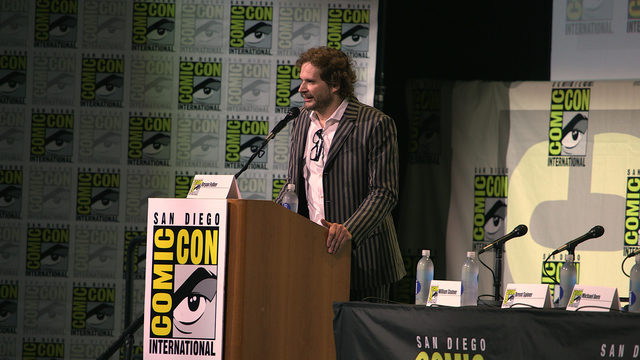
Bryan Fuller announcing the name Star Trek: Discovery during the 50th anniversary Comic-Con panel in 2016
First seasons are always a little rough, and creating a first season of an entirely new Star Trek show — the first show since since Enterprise was canceled and CBS split from Viacom – makes for even more challenges.
Listen in as Jared, Kayla, and Matt discuss the trials and tribulations of Season 1 of Star Trek: Discovery.
Now that the first season of Star Trek: Discovery is over, The Shuttle Pod will be back to standard form, with bi-weekly podcast topics that span the Trek franchise.
Subscribe to Shuttle Pod: The TrekMovie.com Podcast on iTunes, Google Play Music and Pocket Casts! Like what you hear? Please feel free to leave us a review on iTunes.


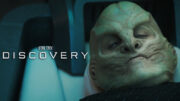
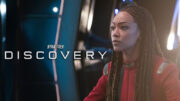
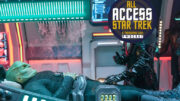
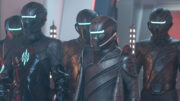
Going to listen to this when I get home, can’t wait!
Don’t bother. 100% negative.
I hope one day we will learn the entire story behind Fullers’ departure and how much of Discovery’s wobbly season 1 and more extremist tendencies is his responsibility opposed to the Harberts clan.
Maybe we will hear about it some day but don’t hold your breath. We still don’t know fully why Bob Orci left the third Kelvin film. My guess is these guys sign NDAs and can probably say as little as possible although I doubt they last forever.
That’s true. These kind of stories usually take decades to be revealed. They typically don’t do a ‘Chaos on the Bridge’ style interview right after it happened.
Yes, I wouldn’t expect it any time soon, I’m sure NDAs are involved, as much as we’d all like them to spill the beans now.
Outside of any NDA there’s also just some distance needed from the project before you can reflect on it. Sometimes the distance is so you don’t have to worry about biting the hand that feeds you, sometimes simply because Hollywood is a small world and maybe the same execs are still out there in new companies that a person might end up working with.
A couple of examples I’ve thought of:
It took nearly 30 years for Bob Justman to publish his stories about TOS. That’s kind of an extreme I think.
Here’s another more recent example, folks like Brannon Braga didn’t really feel comfortable openly talking about how crappy the UPN network execs were until UPN was long dead and the old version of Paramount that he had worked for had been dissolved in the CBS/Viacom split up. He only started to go on the record about those issues in ~2012 when they started filming the interviews for the Star Trek: Enterprise Blu-ray sets. So that’s from 2005 to 2012 or about 7 years.
Matt, just want to say how much I enjoy the podcast. Keep up the great work!
@Tiger2 Yeah you are right probably. Orci is a good example. If they ever talk about it then by their own choosing or the network’s financial considerations (behind the scenes material for future home releases)
Bob Orci ‘left the film’ because he had promoted himself to director and Paramount wasn’t buying it.
It wouldn’t surprise me given that he’s recently walked away from two other series if Fuller walked because he couldn’t get his own way. He definitely strikes me as a bit of a diva.
Good points all around, as usual! And man, would it have been exciting to see different Klingon houses battling each other and dragging other factions into their fight due to the sheer destructive energy of those potential ever-escalating blood feuds (and wouldn’t medieval blood feuds just be the most “Klingon” thing imaginable; just keep in mind how the central premise of ASoIaF/GoT is based around historical conflicts and it works like a charm). But then even the most relatable Klingon character, L’Rell, is basically a pseudo-religous nut without a whole going for her except Mary Chieffo’s brilliant performance. Remember how Chieffo herself pointed towards DS9’s Grilka as a character-inspiration? Even that two-episode character felt so much more relatable and gave the audience a deeper (and more fun) insight into the Klingon soul than ANY Klingon character on Discovery.
With that said, there is a medium-sized elephant in the room concerning the Burnham-redemption-arc, which I would like to point out. Namely that, as I understood from the season finale, Burnham’s actual redemption, with her charges getting dropped and everything, actually happened in large part due to Sarek doing his daddy-thing and essentially telling the council that Michael was a good girl. So Sarek was basically the one who originally talked Burnham into attacking the Klingons — a plan which obviously was just very badly executed on the part of Burnham, but not her IDEA — and he couldn’t convince the council that Burnham’s missteps were partly his fault until things had already gone south for good?
That could mean two things: Either the council is really made up of imbeciles with a terribly short memory, or Sarek didn’t really care at first even though he probably could’ve lessened Burnham’s sentence from the start…
Of course the end to the Klingon-Federation War felt kinda senseless, or at least utterly contrived, for a whole variety of reasons (even though I feel lke I know what the writers were aiming for; namely a solution to the conflict akin to the TNG episode “The Defector” where the real climax consists in both parties deciding to NOT fire a single shot), but the most important point would probably be that Burnham really didn’t have a whole friggin lot to do with it. At least that’s how it feels, wouldn’t you say?
The REAL reason Burnham was redeemeed is because when they originally came up with that ending they didn’t know if the show was going to be renewed.
The ending was conceived before they even went to air.
As far as Jareds complaints about the camp, the Mudd episode had its share.
Hmmm very interesting background info. Sounds like some of the things which SOME fans dislike about Discovery (ship design, re imagining the Klingons, initial story) were Fuller’s ideas and the new production team got stuck with trying to get things back on track after cost over-runs and delays. I think they ended up doing a really great job with the stories and looking forward to season 2!.
It will be interesting to see what happens with season 2 now that Fuller isn’t involved at all.
The last installment of Shuttle Pod unfortunately really turned me off (had been a growing feeling over a few installments). May give this a listen but idk yet. Despite my complaints, I still have to say thank you for the hard work you guys do to put this out there for people who do enjoy it.
We appreciate the feedback, and the decency in which you gave it. I hope you find other episodes of the podcast more interesting. We don’t always talk about Discovery, only when the season is new. So there’s a long back catalog of episodes discussing other Trek topics, and more coming, while we wait Season 2 of Discovery.
Great job Podders, I am a new listener and agree with most of your assessments. Good prep, too, culling those quotes to make the case for what Fuller’s intentions might’ve been. The current showrunners changed their tune – at first saying they were following Fuller’s vision, yet by season’s end declaring that they inherited the Klingon war but then did what they wanted with it. A much more developed portrayal of Klingon culture must have been Fuller’s intention – but what then did Harberts & Berg & Kurtzman do instead? They made the war, and the other Starfleeters, a backdrop for a villain trying to get back to the Mirror- a villain who was quickly forgotten once he was vanquished. So what was the point? (I’m guessing Fuller and then HBK thought the Mirror was commentary on present-day USA, but there isn’t much depth to that aim.)
Instead of focusing on the Klingons, they also gave us so much setup for the Ash Tyler arc – but what was the point or payoff for that? That Burnham was learning to love a Klingon? No, for the part that Burnham was attracted to was his human mind/memories and his human appearance (presumably his second dong was excised). So this doesn’t serve the “learn to understand Klingons” theme, nor does it have much in the way of plot payoff (his infiltration culminates in snapping the neck of a minor character – was this worth 5 episodes of setup?)
Another thing, even with the behind-the-scenes chaos and last-minute scripting, they still must’ve known they had two final episodes to wrap up the war, and their vessel to do that was Burnham and L’Rell coming to a mutual understanding. But they barely even attempt this, as you point out in your podcast. There are two scenes in the final episodes with L’Rell in captivity – in both she says variants of “we will crush you.” Thus, at the most important point in the season (a truce being brokered being warring parties), Star Trek Discovery plays like crucial scenes are altogether missing (I almost expected the screen to flash “missing reel”) – the very scenes explaining why L’Rell decides to make peace with the humans and the Federation. (I won’t even go into the baffling mechanics of L’Rell taking the Empire hostage). This would be like Star Trek VI ending with Kirk asking General Change to “please stop” and Chang abruptly acquiescing.
Podcast also raises valid point about tone – Discovery’s failings are made all the worse by its attempt to conjure the aura of Premium Prestige Grit for Grownups. Perhaps if it didn’t take itself so deadly seriously, the nonsensical narrative would go down a little easier. As it stands, the show is guilty of dereliction of duty, for failing to meet the minimum standards of basic storytelling. I appreciate the candor and rigor of the Podders, who do a commendable service while other Trek babblers have been induced to pull their punches.
Agree.
The whole series and even the invidual episodes of Discovery appears to have been made different by writers who payed no attention to what the previous writer did.
The entire series was just random illogical poor storytelling with an inherent lack of continuity. Add to that it’s characterisation was terrible and random.
It’s almost like they did have not any finished ideas for the show and instead they just randomly stuck together rough drafts for ideas and scripts with other rough ideas and scripts and started filming. With no worry about either a larger narrative whole for the plot of the series nor for even individual episodes.
It’s like they had loads of unfinished ideas that despite being unfinished they still wanted to put in the show but had no idea how to present them nor link them together and were unconcerned with storytelling and characterisation.
The show was like was watching one of the Bay Transformer’s film.
I have marathon watched the entire season 1 again.
I agree with many of the comments expressed by the Shuttle Pod team.
I think many of their (and our) concerns would have been addressed if the show-runners had gone for a longer episode duration. They could have done it in 15 episodes, but with each episode being at least 50-52 minutes. That would have meant an addition 7-12 minutes to work with for story-telling purposes (since episodes ranged in duration between 38 and 43 minutes, roughly).
As someone suggested in another discussion, the return in January (episode 10), could have been stretched out to a feature length of 90 minutes; just as episode 15 could have been.
Longer episode duration definitely would have helped solve some of their story telling issues, and left content appearing less rushed and crammed.
Just my two cents…
Agreed. CBS kept proclaiming being on streaming means they don’t have to follow typical TV formats, etc.
The reality is they kept every episode to a TV friendly length (for advertisements), I believe because they licensed DSC to Bell Media in Canada, which is showing it on a standard commercial cable/satellite TV channel. So my hunch is they kept it to the length of a typical prime-time drama purposefully. Which is a shame, as you pointed out, there are a number of places in the season where longer episodes could have helped.
COmpletely agreed. I’ve been binge watching THE CROWN now that’s DSC has wrapped. That series’ episodes go a full hour, and things get much more fleshed out.
I think they could also have packed in more storytelling into the existing length.
And of those 15 episodes, we didn’t need two spent on Harry Mudd and another on Sarek. Even the Mirror stuff was mostly pointless.
Concerning the dark, gritty tone of the show…
On the one hand… I understand that they are speaking to the times. This is what modern television is like. Dark. Gritty. Makes-you-squeamish-at-times entertainment.
On the other hand… The way I rationalised it — This is years before the TNG arena, and a decade before TOS. Before we get to those optimism laden times, we need to earn it; crawl through some pain so we can appreciate the good times. In other words, giving birth to utopia also involves going through hell, because giving birth is a painful process. From that standpoint, dark and gritty makes sense.
Not really since the origin of so called utopia of earth came out of world war 3 and the origin of the so called utopia of the federation came out of the roumlan war.
Hell had already been gone through no need for another hell.
To build on Isabella’s excellent points. The Federation had been in existence for nearly a 100 years (founded 2161) by season 1 of DSC (2256), and prior to that United Earth had been pretty successfully pulled together, as we saw in Star Trek: Enterprise.
We’ve heard the showrunners say similar things to what you said about “utopia being a painful process”. While certainly there’s truth in that, what I think it demonstrates is that the showrunners really don’t know/understand where DSC is located in the history of the Federation. It’s only 10 years before TOS. If DSC were set after the Romulan War, say not long after the birth of the Federation in 2161, I’d buy that idea a lot more.
You are right on the point that the Romulan War could have been a great way to account for so much “dark and gritty”. One of the key gripes of many is that we did not get enough Klingon War. Maybe if we saw more of that, it would justify the approach.
I remember reading a comment / analysis on DS9 and the Dominion War, and the commentator noted that even though you did not always see battles, the feeling of war was there. Sisko was getting daily reports from the front; refugees coming to DS9, etc. That’s a clever and inexpensive war to transmit the idea of war happening, without breaking the bank. Perhaps Discovery could have benefited from some of that type of story telling.
Yep, we’ve talked about the DS9 daily reports idea on the podcast, and in general we’ve said a number of times throughout the season that we really need see this war and the toll it’s taking, after all the show has a top tier budget.
I also think this is one of those places where longer episode run time could have helped (use a full hour rather than ~45 mins). Then they could feel more comfortable showing the front lines, while also moving their main USS Discovery crew centric plot line forward.
Of course all of these suggestions are kind of moot, since in the 2nd half of the season it became clear that the new producers of the show just didn’t like being saddled with Fuller’s ideas for the Klingon War, and just wanted to spend 4 of the last remaining episodes playing in the Mirror Universe. The MU was fun, but I think it overstayed its welcome by an episode, and further detracted from what was said to be the big arc for the season, the Klingon War.
Here’s a chestnut from Gretchen Berg – “And [Mirror] was something we wanted to do because one the main themes of the show this year is about is about self-discovery. And so it just felt like going to Mirror was somehow going to be helpful on that journey.”
Somehow, eh. What, pray tell, were the realizations that Burnham arrived at? That torturing people, committing genocide, and eating your friends is just not for her? Quite the voyage of self-knowledge. “We are Starfleet. We don’t genocide.” Actually, some of those triangle medals of commendation are for Resisting the Temptation to Genocide.
Yeah. Something something/ nurture over nature/our choices define us/the Klingons are just like us/Kelpians are tasty/ something something.
While I do appreciate you all putting these episodes out there and have listened to each episode, it’s been a bit hard to listen to at times. I think there’s a difference between reviewing the show that was delivered and the show that you hoped it was. Yes, there was some poor writing and some terrible episodes, but there were some great episodes in there as well and more interesting discussions to have.
For example, Discovery had some of the best acting I’ve seen in a Star Trek series. To the point where they were able to sell some poor quality writing. On the other hand, I wasn’t crazy about the music in the show but I thought the mirror universe had some of the better scores for this series.
My biggest complaint with this pod though is the amount of spoilers. I don’t read the Discovery news on the website because I don’t want to be spoiled. I figured this podcast would be just discussing the recently aired show, but it ended up spoiling so much that I waited until the show had finished airing to catch up on podcast episodes.
What a bunch of Negative Nellies! If you hate Discovery, you’ll love this podcast. They don’t like the production design. They don’t like how the Klingons were presented. They don’t like how the themes were explored. Etc., etc. Perhaps they need to start an Orville podcast.